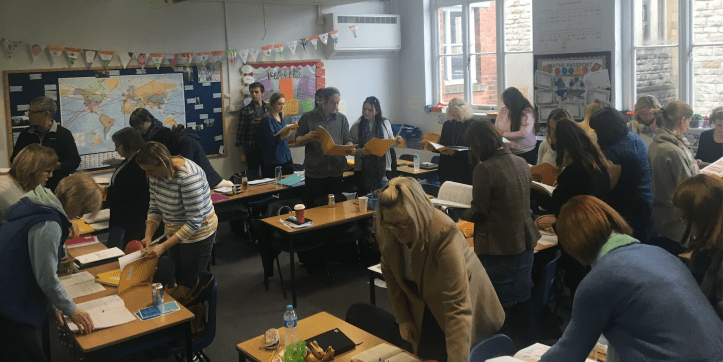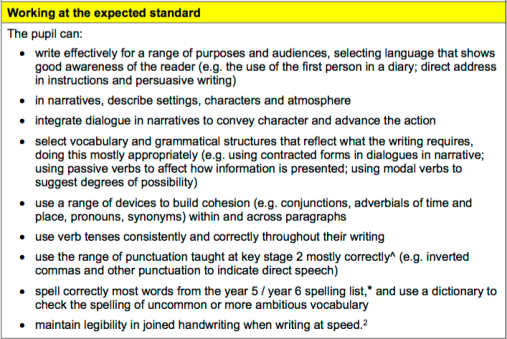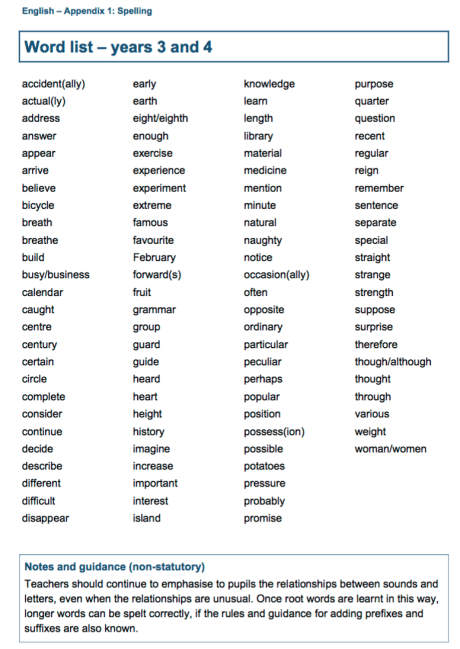
At the end of term I spent a fantastic day working with staff at Cirencester Primary School. As part of the day, we ran an exercise to explore standards in writing – a process I have now facilitated a few times; it is always absolutely fascinating.

As part of my talk earlier in the day, we discussed two of my slides designed to provoke discussion about the pace and intensity of teaching across the schools – as well as the need to plan the structure of the curriculum vertically. Every year group in a primary school depends on the work of the teachers who taught the previous year and sets the platform for the subsequent year. Some pillars in our curriculum tower are arbitrary – but some are absolutely vital: they simply have to be there or less the whole thing collapses.
I usually get general recognition of the reality of this – even if the spikes may be rather exaggerated. Everyone works hard – but do we know what the standards are that we are aiming at for each year group? Are we attacking those standards with real rigour and intensity? It’s a good question to ask.
The exercise involved the following stages:
- Every teacher brought along a sample of writing, spanning the range, but mainly mid-level for their class.
- We set the work out in year group order at stations around the room, hosted by a teacher to explain context (taking turns with two-form entry school) where possible.
- Teachers went from station to station, focusing mainly on the years immediately adjacent to their own but also seeing as much work as possible.
We then gathered back in year teams to discuss some key questions based on observations and discussions during the process:
- What could we be doing differently to support the next year group?
- What could we ask the preceding year group to do to support us better?
- What approaches and strategies do we need better agreement on as a whole school in terms of curriculum planning, assessment and feedback.
When I have run these sessions, the outcomes are usually similar – depending on context. It is helpful when teachers have moved around between years and can put themselves in each other’s shoes so the discussions are more about strategy than feeling like a critique of individuals or simply looking at the year below and saying – why haven’t you managed to teach them the things they should know?
Here’s a flavour of the issues raised:
Vocabulary: How do we continually build vocabulary from year to year? For example, if students haven’t mastered all of the Year3/4 words, how do we continue to reinforce them and also get stuck into Year 5/6 words? How do we balance these demands on our time? What’s the systematic, whole-school process of vocab development in terms of moving from introducing words to using them in speech and in writing, testing patterns, use of homework, revisiting word sets over time – the whole thing? It’s a massive area.
Handwriting: How intensive should we be with enforcing standards of handwriting in each year group? If we insist on joined writing, on the lines in Year 1 – or by the end of Year 1 – are we doing all we can to continually reinforce that standard thereafter? In general terms do we give presentation enough emphasis with the appropriate level of instruction and practice in years when hand-writing might be seen as an assumed skill?
Grammar: As with vocab, are we scaffolding grammar at the right pace – insisting on certain absolute basics (eg fullstops, capital letters) being embedded and sustained early enough? Are we be careful to make sure grammar features are embedded in writing as well as via discrete formal grammar learning and testing. How much practice are we giving students in using certain structures repeatedly enough so that they become comfortable to use them spontaneously in their writing?
Genres: Are we covering the range of genres in an interesting, cumulative fashion, across KS2, giving children enough exposure and dovetailing the genre-features with wider vocab and grammar development?
Reading: Do we all have a good technical appreciation of the development of reading skills, using phonics – including beyond KS1 – and a range of class-reading strategies- individual, group, whole-class – in the most effective manner?
Since doing this activity, I’ve had a fresh look at the DFE KS2 moderation materials – with huge thanks to Tim Roach @MrTRoach. This link takes you to the full document – it’s a fascinating read for anyone interested: (beyond those who will know them inside out.)
The document includes the normal descriptors – such as this one for Expected Standard.

But this all comes alive with the four sets of exemplar writing, designed to illustrate the standards in some detail. Frankie’s work for Greater Depth is a great read and this from Morgan (expected) gives an idea of how the annotations highlight the features of the standard:

There’s a lot going on – so it clearly pays for teachers to be discussing this in depth at every stage leading to Year 6; every teacher plays their part in generating children capable of writing to an excellent standard.
This document from DFE is designed to support spelling – it’s extremely detailed, giving lots of non-statutory exemplification of the requirements.

It’s worth lining this up with the equivalent Y5/6 list to see the difference. (I don’t know if this has been updated since 2013 – but someone will tell me I’m sure.)
The main message I would give is to make sure that every teacher in a primary school has a really good idea of the whole process so that they then have a very much better understanding of the standards and intensity they should be pitching for in their year – this will influence day-to-day teaching and the extent to which they scaffold or challenge children with their writing on any given task.
Thanks to Cirencester staff for hosting me – and to the other primary colleagues I’ve worked with this year who have also helped me to understand more about the extraordinary work you do.


